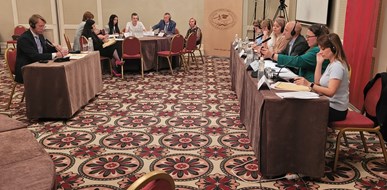[Mock Trial] Specialised Judicial Training Series for Ukrainian Courts, 2nd in-person edition, June 2025
Published 13 June 2025
@Mock Trial organised on 12-13 June 2025, Kyiv, Ukraine
On 12 - 13 June 2025, the Asser Institute, with support from the National School of Judges of Ukraine (NSJ), and the collaboration of the European Union Advisory Mission in Ukraine (EUAM), held a two-day Mock Trial in Kyiv, Ukraine. The Mock Trial formed the second component of the 2nd edition of the ‘Specialised Judicial Training Series for Ukrainian Courts’, which started with six online sessions earlier in spring 2025. Ukrainian judges, legal assistants, and court staff were selected for the Mock Trial based on the successful completion of assessments and participation in the online training series.
Participants engaged with both international and national experts, including judges, legal practitioners, and advisors. Ukrainian speakers shared perspectives from their own practice: Tetiana Shtykh, Judge, Dzerzhynsk District Court of Kharkiv Oblast; Vladyslav Ovsiannikov, Judge, Derhachivskyi District Court of Kharkiv Oblast; Nadia Volkova, Founder and Director of the Ukrainian Legal Advisory Group (ULAG) & Legal Advisor, Ukrainian Archive.
They were joined by international experts: Magda Koole, Senior Advisor on Adjudication of International Crimes, EUAM Ukraine, Judge at the Hague Court of Appeal; Alma Taso Deljkovic, psychotherapist, former Head of the Witness Support Office, Court of Bosnia and Herzegovina; and Philip Dygeus, Lieutenant Colonel (OF-4) & Legal Advisor, Swedish Armed Forces.
The Mock Trial was structured over two days, aiming to be a realistic simulation of a court proceeding in a war crimes case in a Ukrainian court, allowing participants to work on various substantive and procedural questions which can arise in such cases. The case centered on a shelling incident charged under Article 438 of the Ukrainian Criminal Code. Participants were tasked with defining and clarifying the charges and addressing the types of substantive and procedural questions that frequently arise in such trials.
Each participant was assigned to one of the three six-person teams of judges, prosecutors and defence lawyers, encouraging them to collaborate and jointly reflect on the case’s key issues. Over the course of the trial, they examined three fictional witnesses, played by two of the experts, Philip Dygeus (Swedish Armed Forces) and Nadia Volkova (ULAG & Ukrainian Archive), as well as a professional actor, Roman Shurin (Institute of Culture). Through direct and cross-examination, the participants practiced assessing credibility, analysing testimony, and developing arguments in line with courtroom practice.
The exercise also integrated trauma-informed approaches, challenges of handling digital and OSINT-based evidence, and strategies for ensuring fairness, dignity, and justice in international crimes proceedings.
The key conclusion of the Mock Trial is that effective capacity-building for courts addressing international crimes and more broadly accountability for international crimes depend on combining legal precision and practical strategies that uphold justice, fairness and dignity.
Read more:
These activities were conducted by the T.M.C. Asser Institute under the ‘Restoring Dignity and Justice in Ukraine’ programme, funded by the Ministry of Foreign Affairs of the Netherlands, and implemented by a consortium led by the International Development Law Organization (IDLO) in partnership with the Asser Institute, the Center for International Legal Cooperation (CILC), and the Netherlands Helsinki Committee (NHC).
